Whether merch is really dead remains a subject of heated debate. But it’s the end of an era at one of the most influential and beloved brands behind menswear’s graphic tee explosion: the co-founders of Online Ceramics are parting ways. In an announcement shared with GQ, Alix Ross and Elijah Funk stated that Ross is departing the brand to “pursue new ventures.” Funk is staying on and will continue to run Online Ceramics.
Their final project together is a 348-page compendium published with frequent Online Ceramics collaborator A24. Tricker’s Cabin: The Oral & Visual History of Online Ceramics traces Ross and Funk’s quixotic journey before and after launching a Grateful Dead bootleg outfit in 2016. “The book is both a capstone to an incredible partnership and an anthology of a singular, boundlessly creative friendship,” they said in the statement.
In a phone call on Tuesday, Funk elaborated on his future plans for Online Ceramics. “My main M.O. is to turn it into more of a ‘brand-brand,’” he said. “Maybe we’ll do fewer collabs and focus more on Online Ceramics itself.” He added that he wants to expand into new categories like home goods and potentially even sneakers, while elevating the quality of the core graphic tees and sweats. “But,” he cautioned, “we’re based on hippie shit, and I don’t want to lose sight of that.”
For his part, Ross told me he is in the process of launching two projects, a merch brand and a more fashion-forward line that he described as “cursed Brandy Melville.”
Ross’s departure is significant because the Online Ceramics deadhead-meets-hardcore-meets-Ram Dass aesthetic—now as recognizable and prevalent in culture as Supreme skate tees or the “Life Is Good” empire—is inseparable from their partnership. From the start, they looked like an unlikely pair, like the setup for a joke: a yogi (Ross) and a crust punk (Funk) walk into a screen printing studio.
The center of their creative Venn diagram was their ironclad devotion to the music and iconography of the Grateful Dead, a fascination with the spooky rural aesthetics of their native Ohio, and a restlessness they had been working through in DIY art and experimental music scenes between LA and Columbus, where they met as art school freshmen. But Online Ceramics was also the product of each founder’s individual obsessions, like Ross’s Hare Krishna practice and journeys through psychedelia, and Funk’s veganism and the graphic references he’d developed as a teenager making merch for his underground bands.
Their collaboration birthed hundreds and hundreds of covetable tees—most of which are archived in the book—that were obsessively collected by a cult fanbase whose members included Virgil Abloh, John Mayer, Emily Ratajkowski, and costume designers all across Hollywood, who used Online Ceramics in productions like Euphoria to represent contemporary stoner style.
For a boot-strappy operation that often left customers waiting months for their orders (which, really, was part of the appeal), Online Ceramics was extraordinarily influential. Their original approach to the old idea of Shakedown Street gear ushered in a boom in intricate graphic design in menswear, and their A24 film tees and collaborations with the likes of Mayer, The North Face, and even GQ fueled the merch-ification of everything.
Eventually, as merch peaked and their aesthetic became a bona fide fashion trend, they evolved Online Ceramics into something more like a multidisciplinary art platform, one that encompassed a legitimate fine art practice (Ross and Funk held their inaugural gallery show at David Kordansky in LA in 2021) and an annual horror movie festival.
As their empire grew, Ross and Funk’s creative process changed. In the early days they pored over each T-shirt and hoodie design together, with Ross coining OC’s signature far-out koans—“Finding time to play the flute to Planet Ocean,” etc.—and Funk layering on the skulls and warlocks. But in recent years Online Ceramics has felt like two individual brands, with the founders working in their own lanes, to the point where the founders noticed they had “Elijah customers” and “Alix customers.” Funk’s designs have the organic and irreverent qualities of classic Online Ceramics, while Ross’s look more like pages out of experimental zines dedicated to mushrooms, horror films, and lightly provocative spiritual humor. (Like: “If You Can’t See God In All, You Can’t See God At All.”) Funk designs fonts in Photoshop; Ross is a Times New Roman evangelist.
Somewhat poetically, Ross and Funk’s first Online Ceramics drop was for Dead & Company’s tour in the summer of 2016, when they sold their unauthorized designs in parking lots as they followed the then-fresh Grateful Dead tribute band around the country. One of their final (long-since officially sanctioned) drops together was for Dead & Co.’s Sphere residency, which marks the end of the road for the Bob Weir and John Mayer-led project, too.
A few months ago, I got a text from Ross with the image of a design he’d made for the Vegas finale. The T-shirt had a huge cartoon Pokemon hitting the classic Grateful Dead “dancing bear” pose beneath the words “Forever Grateful.” The spirit of Online Ceramics, done in a novel way. “My magnum opus Dead tee,” Ross said. “I think I have to retire.”

